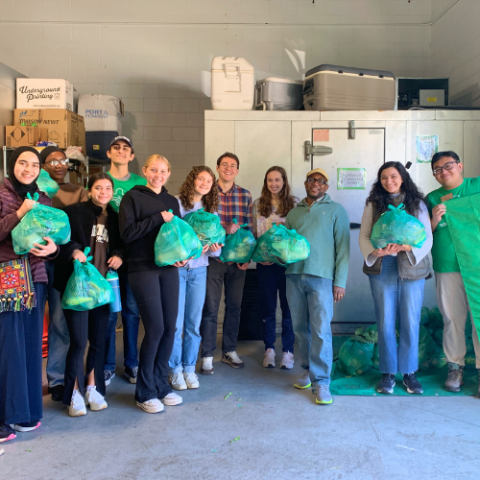Tracing the Roots of Nutrition Access, Implementation and Policy (2023-2024)
This project team supported ongoing community-derived goals for the coordination of Durham’s food security organizations. Team members collected novel data and insights regarding federal program utilization to effectively coordinate efforts among nonprofit, local government, faith-based and medical partners.
One subteam focused on understanding the perspectives of community members and entities on how food and nutrition policies are implemented. Team members looked into how Durham and Duke entities have addressed food and nutrition security and broader social determinants of health, as well as these entities’ relationship to federal and state policies.
The second subteam focused on gaining a greater understanding of policies surrounding food and nutrition security and social support programs regarding social determinants of health at the federal, state and local level. Working closely with Duke’s World Food Policy Center, Department of Population Health Sciences, the Margolis Center for Health Policy and other campus and off-campus sites, team members considered public and health-oriented policy.
Through literature reviews, site visits to policy-related centers at Duke and Durham, and interviews, team members prioritized evaluating racial equity in service implementation and investigated the extent to which policies demonstrate innovative and effective methods improving health outcomes of historically excluded populations.
Timing
Fall 2023 – Spring 2024
Team Outputs
Literature reviews
Qualitative data regarding experiences and perceptions of hunger relief programs
Public scholarship on health equity and programs addressing social determinants of health
Dissemination of findings to public and private sector stakeholders
Tracing the Roots of Nutrition Access, Implementation, and Policy (Poster presented at Fortin Foundation Bass Connections Showcase, April 17, 2024)
This Team in the News
The Sullivan Award: Honoring Three Who Aid Others at Duke and in the Community
Addressing Food Insecurity on a Local Scale
Thinking Locally about Food Insecurity: Community-Level Research on Food and Nutrition Access
Student Spotlight: Elaijah Lapay ’24
See related teams, Tracing the Roots of Nutrition Access: University to Community (2024-2025) and Improving Food Security to Increase Resiliency to COVID-19 for Latinx Populations (2020-2021).
Image: Members of the Tracing the Roots team volunteering at Root Causes (Photos: Courtesy of Elaijah Lapay)

Team Leaders
- Hannah Lane, School of Medicine-Population Health Sciences
- Elaijah Lapay, Trinity College of Arts and Sciences–Undergraduate Student
- Norbert Wilson, Divinity School|Sanford School of Public Policy
/graduate Team Members
-
Noah Gibson, Sociology-PHD, Sociology-AM
-
Isabella Bouklas, Sociology-PHD
/undergraduate Team Members
-
Jordan Troob, Biology (BS)
-
Carolina Mendez, Robertson Scholarship - UNC
-
Amy Labrador, Public Policy Studies (AB)
-
Habibatou Koureichi, Public Policy Studies (AB)
-
Husna Khan
-
Katherine Hamilton, Public Policy Studies (AB)
-
Deven Gupta
-
Samantha George
/yfaculty/staff Team Members
-
Saskia Cornes, Franklin Humanities Institute
-
Ryan Kane, School of Medicine-Medicine: General Internal Medicine
-
Scott Brummel, Science & Society
/zcommunity Team Members
-
La Iglesia Emanuel
-
PORCH-Durham
-
Benefits Data Trust
-
End Hunger Durham
-
El Centro Hispano, Durham
-
Lincoln Community Health Center
-
Farmer Foodshare
-
Durham County Food Security Task Force
-
Root Causes
